Emio - The Smiling Man: Famicom Detective Club review - an engaging mystery with 35-year-old mechanics
Bag for life.
Let's lay out the facts of the case: Eisuke Saski, a high schooler, has been found strangled by a pumping station outside of the city. The object used to kill him is missing, but the true oddity is the paper bag with a grinning face drawn upon it placed over his head. A regular high schooler no more, this bag connects Eisuke to an uncaught serial killer from 18 years ago, who did the same thing to their victims. The twist? All three of those original victims were teenage girls. (Here's where the 'dun dun' would go if this was a Law and Order episode.)
It's for this reason Inspector Kamada has asked the Utsugi Detective Agency to assist with the investigation. Alongside the stern Detective Kuze and slightly careless Detective Kamihara, you'll use your little grey cells to discover why Eisuke was in such a remote location, who killed him, and if his death is truly connected to the unsolved murders from so long ago - even if Kuze, somewhat suspiciously, would really prefer if you were off the case.
This isn't all you'll have to contend with, however. Something spooky is afoot, for that paper bag ties the case to the urban myth of Emio, the Smiling Man. He appears in front of crying girls and promises to give them a smile. A permanent one. If the girl laughs then Emio walks away, but if she doesn't… Well, she doesn't have anything to smile about.
I love urban myths and, frankly, anything vaguely supernatural, so I was fully prepared to discover the truth behind Emio. Though important to the overarching narrative, the game chooses instead to focus more on the human element of Eisuke's death and its surrounding mysteries, rather than supernatural shenanigans. There's a subtle undercurrent of exploring the effects of trauma and grief flowing throughout the game. As the secrets characters hold are gradually unveiled, you witness how these emotions can flood a person until rationality is almost lost. It can be seen in Megumi, one of Eisuke's closest friends. You track her down in an attempt to learn more about his final days, only to discover a concoction of grief and guilt over her possible part in his death have trapped Megumi inside her bedroom. It's a fitting subject for a story told through the eyes of characters barely older than the boy whose death begins the tale; portraying both the shortness of life and how the events of our youth mould who we become.
Emio - The Smiling Man also has a good balance of mysteries and reveals, so, even when you stray from the main case, it still feels like you're working towards one definitive ending where no thread has been left untied. The bittersweet tone also cast aside any disappointment I had from the lack of focus on the urban myth storyline. It's one I've always found suits detective fiction very well, because solving a crime doesn't always bring true resolution for those who must rebuild their lives in wake of the departed.
That's not to say the writing is perfect. A few characters are so obviously hiding something they might as well be holding up a boombox blaring 'I am suspicious' on constant repeat outside your window. Then there's Tsubasa Fukuyama, a teacher at Eisuke's highschool who is also a former upperclassman of Ayumi Tachibana, the series' teenage girl protagonist. While Fukuyama's dedication to his students is enduring, one particular scene where he competes with the male protagonist over who knows Ayami better is rather uncomfortable. Those moments aside, Emio - The Smiling Man handles the rest of its characters well. I first found Detective Kamihara annoying, for instance, but grew to like him as his childish nature fell away to reveal a skilled detective who uses a mask of immaturity to put people at ease.

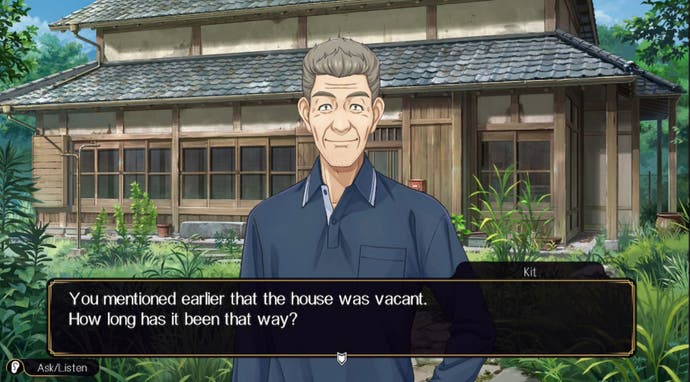

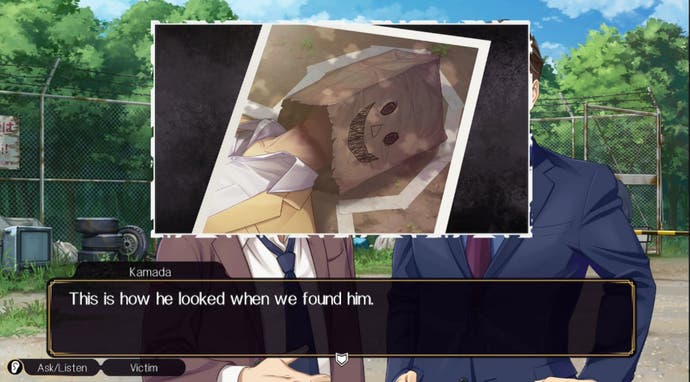
When it comes to mechanics, however, Emio - The Smiling Man does show some of Famicom Detective Club's age. As you might've guessed from the name, this is a series that's been around for a while, but aside from a remake of the first two entries in 2021 (and Ayumi's cameo as an assist trophy in Super Smash Bros. Melee), we've not seen it for a while. This is the first new entry in 35 years.
It's out of a sense of faithfulness, then, that Emio - The Smiling Man keeps to a simple visual novel-style structure. In fact it's a near carbon copy of the series' past instalments, with the only significant difference being alternating perspectives between the male protagonist and Ayumi, who is playable for the first time. It's an easy loop to understand - you exhaust an individual's dialogue options until you either have to ask for observations, show them something, look at something or have a think. Doing so either unlocks a new line of questioning or additional dialogue to a previous one causing you to repeat the loop until the scene ends.
Emio - The Smiling Man is incredibly linear as a result, confining you to these dialogue scenes and shuttling you on to the next one as quickly as possible. While fitting the visual novel format, it dampens the investigation aspect by stealing your ability to actively explore many crucial areas. Things only truly open up in the final chapters of the third act, where you're finally given the chance to move in between locations - a very welcome freedom after so many long conversations. Admittedly, it adds a dose of realism - people certainly aren't going to be standing around doing nowt, on the off chance a teenage detective returns to 'Just one more thing' them, Columbo-style - but ultimately it can feel a tad restrictive.
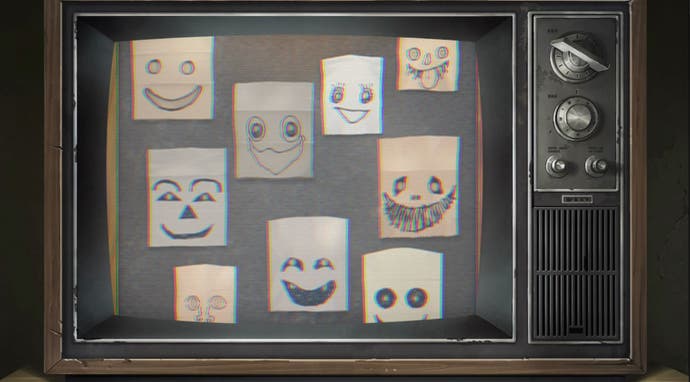
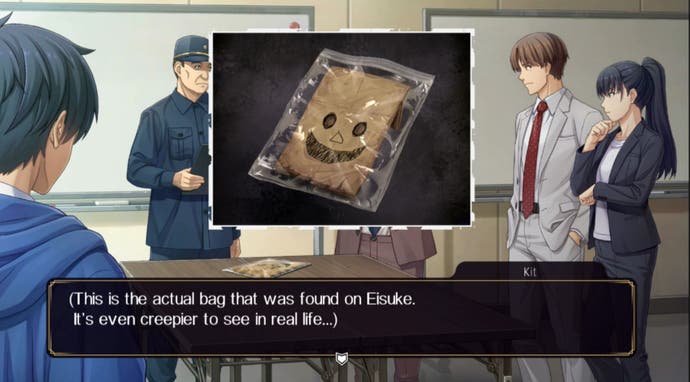
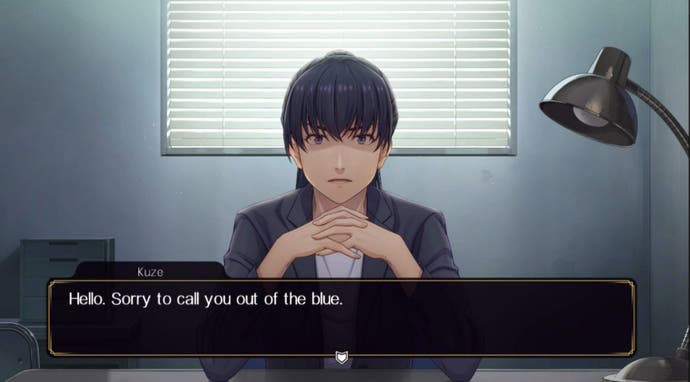
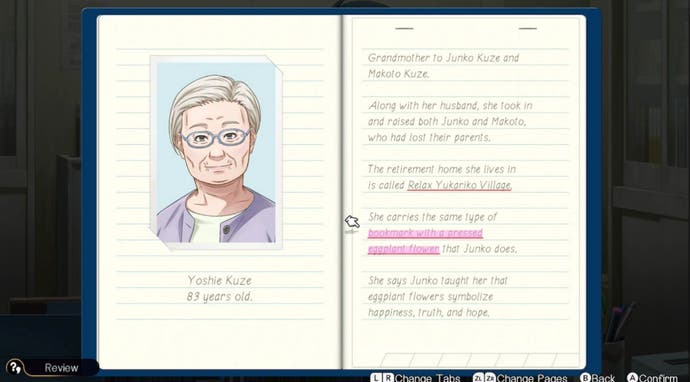
Puzzles, meanwhile, typically occur at a chapter's end when you review the case's progress, in either the form of multiple choice questions or typing out a missing word. Spelling is important with the latter, since one incorrect letter results in the wrong answer and the game asking you to try again (as I comically learned the hard way when trying my luck with some 'close guesses' at times). I only ever found myself properly stuck when the male protagonist was himself stuck at a bus stop in the middle of nowhere (which may well have been intentional anyway). Still, it's a shame Emio - The Smiling Man rarely goes beyond the dialogue loop to utilise more point-and-click focused mechanics, or more varied puzzles, to get you physically hunting down clues.
While Emio - The Smiling Man's mechanics are simple, however, it does succeed in telling a good story. Many of the best detective stories hide the tales they're actually telling. They offer clues to help you find the right path, but are never afraid to block your journey with a red herring. It's up to you to determine fact from deception and craft the solution from all the hints you've gathered. Some will still hold something back - a little treasure of truth, which, when spoken, has the power to completely change your opinions of past events. Such a twist only works if the foundations it's built upon are strong enough to sustain it though.
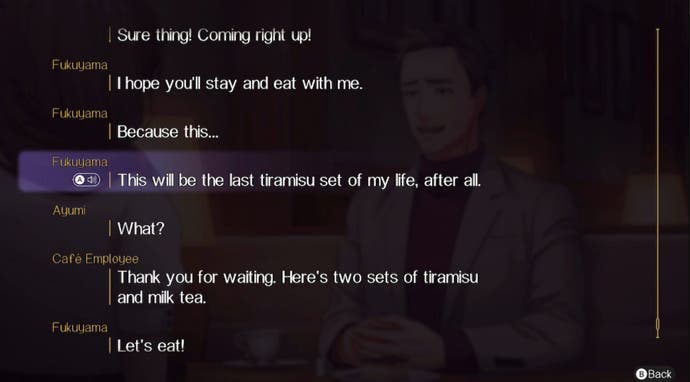

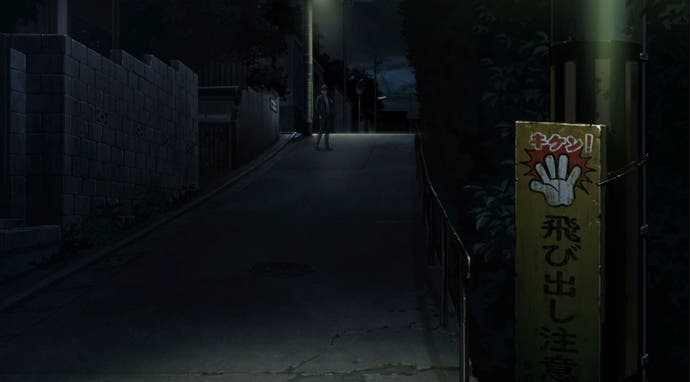
When I first started playing Emio - The Smiling Man, I expected a story of detectives haunted by an urban myth come to life and, as the narrative began to take shape, I was worried I would dislike the ending. Yet, while part of its foundations, this wasn't the true story being told. In reality, it dares to delve deep into the complexity of human emotions and never falters in doing so. Without spoiling anything, when the ending finally did come I was left, sitting in the darkness of my flat, contemplating the conflicted sorrow it brought me.
It can't be ignored, however, that the heavy emphasis on dialogue can easily wear on anyone hoping for more complex gameplay. Even as a fan of dialogue-focused visual novels, I would happily see the Famicom Detective Club series go beyond its established formula if we do get another instalment. When it comes to Emio - The Smiling Man though, we've been given a faithful adaptation of the past instalment's gameplay - perhaps too faithful, for a series which last got a new main entry in 1989 - wrapped inside a story about love, loss and the importance of recycling paper bags.
A copy of Emio - The Smiling Man: Famicom Detective Club was provided for review by Nintendo.


